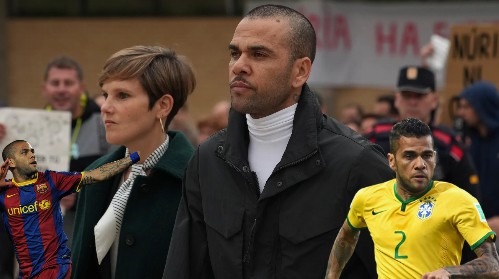Dani Alves: In an unexpected twist, the High Court of Justice of Catalonia has overturned the rape conviction of former Brazilian football star Dani Alves. Once sentenced to four and a half years in prison, Dani Alves now walks free after the appeals court unanimously deemed the ruling unsafe.
The dramatic legal reversal follows over a year of custody and a hefty €1 million bail payment in March 2024. Alves, who had been convicted of raping a 23-year-old woman in a Barcelona nightclub in December 2022, faced significant public scrutiny. Now, however, the court’s ruling has lifted all travel restrictions, allowing him to leave Spain.
Why the Conviction Didn’t Hold Up
Three judges—two women and one man—carefully examined the evidence and found troubling inconsistencies in the original case. Their main concerns revolved around gaps in the prosecution’s arguments, inaccuracies in the evidence presented, and contradictions in the complainant’s testimony.
Most notably, the court declared the alleged victim an unreliable witness, emphasizing that Alves’ presumption of innocence had been compromised. The initial ruling failed to properly compare biological and fingerprint evidence with the complainant’s statements, raising doubts about the validity of the conviction.
A Legal Battle Far From Over?
Though Dani Alves is now a free man, this saga may not be over just yet. The ruling can still be appealed to the Supreme Court in Madrid, where further scrutiny could either reinforce or challenge this latest decision.
Legal analysts suggest that while overturning a conviction is rare, especially in high-profile cases like this, it does not necessarily mean that Alves is entirely in the clear. The Supreme Court could still reinstate the conviction or order a retrial, keeping the footballer in a precarious legal limbo.
Implications for Spain’s “Only Yes Means Yes” Law
This case marks one of the most significant legal tests for Spain’s controversial “only yes means yes” law, introduced in 2022 to strengthen consent-based sexual assault legislation. The law was intended to prevent legal loopholes and ensure that the burden of proof did not fall solely on victims.
However, critics argue that this latest ruling could weaken the law’s credibility. If a high-profile case such as this can be overturned due to inconsistencies, it may cast doubt on the effectiveness of Spain’s legal framework in prosecuting sexual assault cases.
Dani Alves: Redemption or Reputation in Ruins?
Despite regaining his freedom, Alves’ career and public image may never fully recover. Once one of football’s most celebrated right-backs, his name is now entangled in a legal controversy that has overshadowed his sporting achievements.
Some fans and former colleagues remain supportive, arguing that the overturned conviction proves his innocence. Others, however, are less convinced, believing that the legal technicalities do not necessarily equate to exoneration. The court’s decision may have given him legal relief, but his reputation remains under intense scrutiny.
What Happens Next?
With the legal door still open for further appeals, the story of Dani Alves is far from reaching a definitive conclusion. If the prosecution decides to take the case to the Supreme Court, Alves might find himself back in court yet again.
For now, though, the former Barcelona star has regained his freedom—but at what cost? His football legacy, once defined by trophies and triumphs, now carries the weight of a scandal that may never be forgotten.














